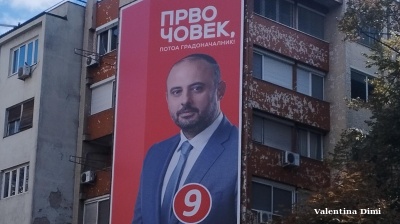The largest opposition party in North Macedonia, VMRO-DPMNE, started celebrating late on May 8 following its resounding victory in both the general election and second round of the presidential election.
In the second round of voting for North Macedonia’s next president, the candidate of conservative VMRO-DPMNE, law professor and MP Gordana Siljanovska Davkova (70), secured 65% of the votes, surpassing the incumbent president and the candidate of Social Democrats (SDSM), Stevo Pendarovski, who garnered just 29.3% of the vote, with 93% of ballots counted.
Siljanovska Davkova's win marks a historic moment as she becomes the country's first female president.
Discontent with the governance led by the SDSM, in alliance with the ethnic Albanian Democratic Union for Integration (DUI), became apparent during the first round of the presidential elections on April 24. Voters overwhelmingly backed the opposition, rallying behind Siljanovska Davkova.
In parliamentary elections, the VMRO-DPMNE-led coalition captured 43.1% of the vote with 91.9% of votes counted, while the SDSM-led coalition trailed with only 15.1%, data released by the state election commission (SEC) indicated.
"We have achieved victory. Macedonia has triumphed. This marks a historic moment for our nation," leader of VMRO-DPMNE Hristijan Mickoski, who is set to become the new prime minister, stated.
Attributing the government's downfall to issues of crime, corruption, nepotism and manipulated tenders, Mickoski stressed the need for accountability.
Mickoski also reiterated his stance against using the prefix ‘North’ in the country's name, a change made by the previous SDSM government to resolve a longstanding dispute with Greece that had held up the country’s EU accession.
He confirmed plans to initiate negotiations as soon as possible with opposition parties for a new government formation.
Within the Macedonian bloc, the opposition pro-Russian Left party secured 6.8% of the vote, while the newly formed Znam, a splinter party from the SDSM, received 5.3%. Other minor parties failed to cross the threshold for parliamentary representation.
Among the parties representing the country’s sizeable ethnic Albanian minority, a coalition led by the DUI, comprising various ethnic minority parties, won the largest share of the votes (14.1%), edging out the opposition front Vlen, which took 11% of the votes.
However, VMRO-DPMNE has expressed reluctance to form a coalition government with the DUI, opting instead to align with the opposition VLEN.
Znam’s MPs are also expected to be part of the new government.
Projections indicate that VMRO-DPMNE may secure 59 parliamentary seats, with the SDSM on 19, the DUI on 18, Vlen on 13, Left on six and Znam on five.
Analysts believe Mickoski is in a strong position to establish a new government, given the party's electoral success.
More than 1.8mn eligible voters were eligible to participate in the elections across 3,360 polling stations, tasked with electing 120 members of parliament and the next country’s president.
The voter turnout for the presidential election stood at 46.38%, while for the parliamentary election it reached 53.41%, with 93% of the votes counted, according to the SEC.
News

Thousands rally in Tirana demanding justice for former KLA leaders on trial in The Hague
Albanian PM Edi Rama called the protest, urging all Albanians to unite behind what he described as a “national cause” — defending the honour and legacy of Kosovo’s wartime leaders.

Putin's meeting with Trump in Budapest is a slap in the face for the EU
As preparations get underway for a highly anticipated summit between Russian President Vladimir Putin and former US President Donald Trump in Budapest, attention is turning to an unusual but politically sensitive detail: how will Putin get there?

Zelenskiy leaves Washington empty handed, Trump and Putin head to Budapest to talk business
Ukrainian President Volodymyr Zelenskiy went into a White House meeting with US President Donald Trump on October 17 hoping for a big arms deal. He came out of the meeting empty handed.

Taiwan’s KMT elects new leader
Cheng Li-wun, the only female contender among six candidates, defeated former Taipei mayor Hau Lung‑bin by a wide margin, winning over 50% of the ballot in the leadership race for Taiwan’s opposition Kuomintang on October 18.



